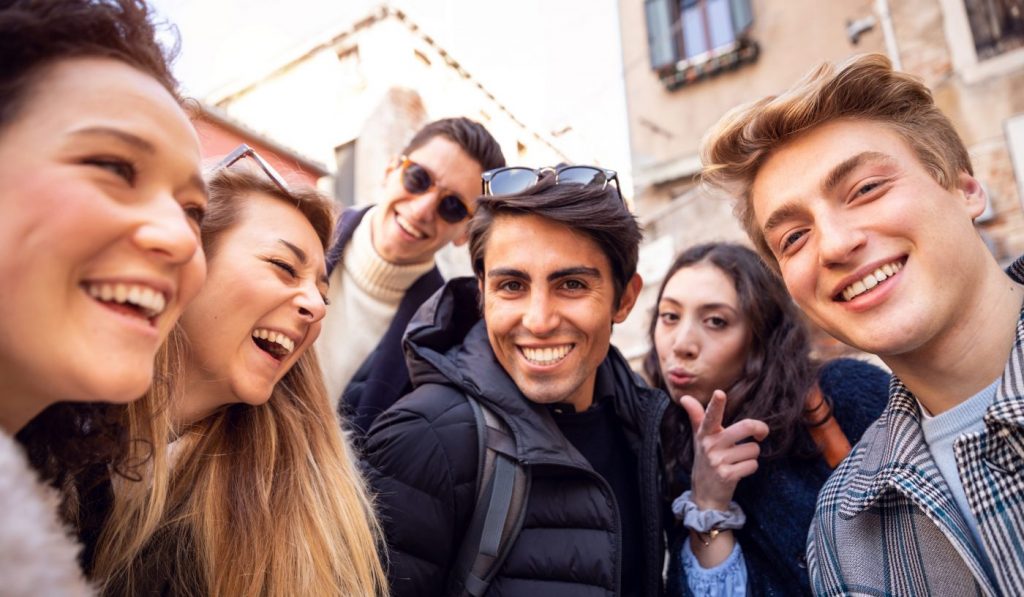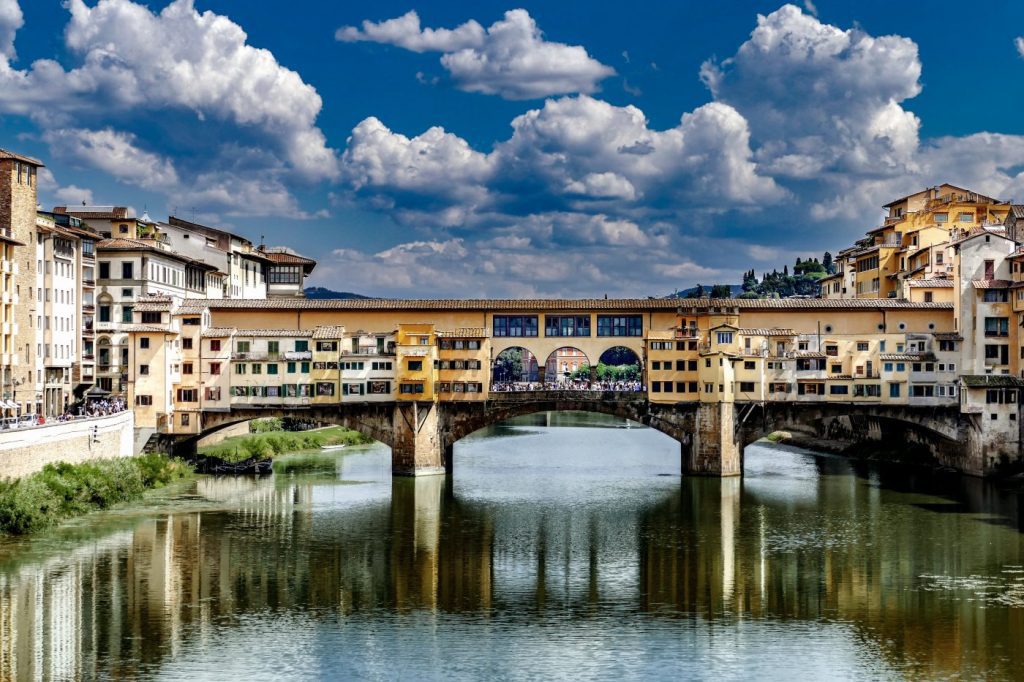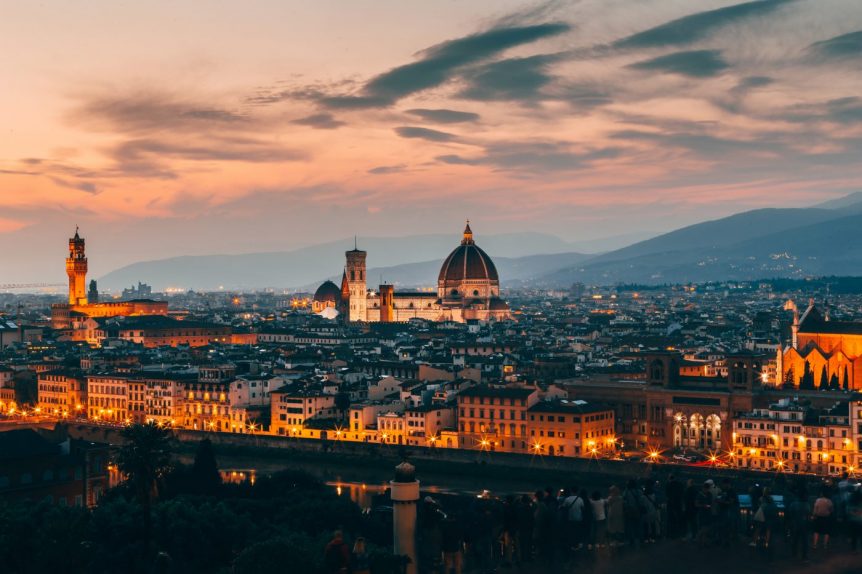By Kelsey Shea, LL’20/21, gcLi Penn-GSE Fellow ‘21, Service Coordinator and Faculty member, St. Andrew’s School (RI).
“Just know that we may cancel this anytime before your flight actually takes off.” That was the tagline of the Renaissance Florence class this year. We knew that it was a 50/50 chance that we would actually be able to go to Florence, Italy, to see all of the amazing art and architecture we had been discussing since August but the hope was there nonetheless. Much like the rest of the country, I had been watching the news like a hawk, waiting for more information on the Omicron variant of COVID and whether or not there would be any new travel restrictions in place. Boarding the plane in Boston with nine seniors and two other faculty chaperones, I kept waiting for someone to tell me this wasn’t actually happening. I hadn’t traveled outside of the country since before the pandemic began and I was in shock that we were actually on our way. Traveling with students is always stressful but ensuring their safety during a pandemic was a whole other level of intense.
Bridging the Gap: Leadership and Reflection in the Classroom and Beyond
The goal of the class is simple: students get to experience the wonder of the places we discussed during the semester while also building leadership capacities in their exploration of the city and tours they give their classmates. The kids were so excited to get out and explore once we got there. The first day they felt a little smothered with all the attention and constant check-ins but after they got the feel of where we were located and the general layout of the city, they were free to adventure on their own. I was shocked at how quickly they picked things up and how confident they felt heading off. They had two assignments while we were there: give the class a tour around one of the museums or churches and to keep a journal about their experience. They had to plan the route to get there, do a site visit ahead of their presentation to run through the tour they would give, and ensure we could actually get in. Though closures due to COVID forced some students to pick different sites than they had prepared to present at home, they were largely successful in their efforts as tour guides. It was clear that students had taken to heart the lessons from our earlier classes as they were in charge of managing their own time in the afternoons and, coming from a school where a substantial portion of our students struggle with executive functioning skills, I was impressed with how well they blocked out time to work on their projects and their journals.

One of the most important parts of leadership is reflection and the journals allowed students a space to reflect on their daily experiences. Passing out the journals before we left for the trip, I wasn’t sure whether students would actually engage in written reflections; I had never seen most of them willingly hand write anything. The goal was for their entries to be thoughtful and detailed reflections on their leadership growth, their engagement in their peer’s leadership activities, and their journeys around Florence. The level of dedication the students put into these journals was surprising and impressive. They pasted postcards, ticket stubs, brochures, and a number of other souvenirs amongst their written reflections of the day’s events. While some days went deeper than others, it was clear that having a dedicated space to reflect added to their experience greatly. In one student’s final entry they wrote, “I wasn’t sure I’d like having a journal on this trip… I don’t write in a diary or anything like that at home but it is pretty cool. I feel like if I hadn’t done it I wouldn’t remember everything we did or all the work I put into my project so yeah I think this has been worth it.”
When Plans Change: Modeling Flexibility and Adaptability for Students
As with any trip abroad, we were bound to run into some issues. There were restrictions in place due to COVID that forced museums to close on certain days or severely limit capacity so we set the expectation early that flexibility and adaptability were going to be necessary for our trip. Walking up to the pharmacy on our last day to get our COVID test, the students were all sorts of anxious, and, to be honest, so were the chaperones. Would any of us test positive? We knew that if one of us had it, someone was going to have to stay behind and quarantine with them while we waited for their family to arrive. Our travel insurance would allow us to do so without a problem, but the fear was still there. Thankfully, Italy has rapid PCR tests so we didn’t have to wait long to find out our results. Walking down the stairs knowing we were set to leave the following morning, we felt relaxed and excited to return home. As soon as we got out of the building, phones started dinging. There was a transportation strike happening and our flights were canceled. I looked at my fellow chaperones and we all took a deep breath and began strategizing. We split into teams– one of us would go home and work with our travel agent to figure out next steps, the other two would take the kids to dinner. As someone who loves a plan, and had a mountain of grad assignments to finish, I was wicked stressed. I needed to get home to finish everything and be able to test to see my family for the holidays. I knew I had to be vulnerable and let the students see that it’s frustrating but we had to make the most of the time we had left together. When we got home, we learned that we probably wouldn’t know whether we could get out of Italy until the morning so we went to bed in limbo. We ended up staying and making the most of our remaining time; we went back to the local market and had an incredible lunch (probably the best pizza I’ve ever had) and students had more time to explore on their own. In the evening, I held a quiet study time for students who needed to finish work, mostly so I could do the same, and we discussed our thoughts on the trip as a whole. Even the students who were most distressed by the change in plans focused on the positive aspects of the trip. They were proud of themselves for masking constantly, for getting along with everyone, and for the growth they saw in themselves.

Ultimately, I could not have asked for a better experience. Were there moments of stress for everyone? Absolutely. Was it the most intense COVID nasal test we had ever experienced? You betcha. But we did it. We were able to experience things we had been reading about and discussing for nearly five months. We were vigilant about masking and safety, we ate a ton of gelato, and no one got lost.
—
Kelsey Shea is currently the Service Coordinator, a humanities faculty member, and a dorm parent at St. Andrew’s School (RI). Before her current position, she taught at Enloe Magnet High School in Raleigh, NC, where she first delved into the necessary work of building student leadership capacities through service learning. She enjoys introducing students to the importance of service and helping them navigate their leadership journeys. She is a Lab grad and a recipient of the gcLi-Penn/GSE scholarship for School Leadership.

